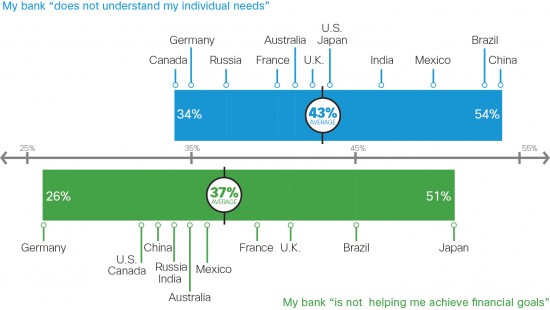As a connected consumer, I can buy a book, plan a vacation, or choose a movie from any number of devices and from any location (home, office, car, or airport!). These interactions are not only convenient, they are more and more highly personalized and tailored to my likes and dislikes. We have all experienced this on Amazon and other commerce sites.
Unfortunately, we don’t get this experience from many banks.
In a Cisco survey of more than 7000 smartphone users and bank customers in 12 countries, 43 percent said that their primary bank did not understand their individual needs. Bank customers in China (54 percent), Brazil (52 percent), Mexico (49 percent), and India (46 percent) felt even more disconnected (see chart below).

That frustration puts banks in an increasingly precarious position: nearly one in four bank customers intend to choose another provider for their next financial product or service. Four out of five would trust a non-bank — such as Apple, PayPal, or a retailer — to handle their banking needs. These disruptive competitors succeed where traditional banks fail: by engaging customers with convenient transactions and relevant, real-time, personalized services.
I am convinced, however, that banks now have an exciting opportunity to drive their own disruption during this time of sweeping change. Brett King, who is the CEO of the mobile bank Moven and recently joined a podcast produced by our team, sees the smartphone as driving “the most dramatic shift in banking behavior that we’ve ever seen.”
I agree.
The opportunity goes beyond just the online-only banking players. In a recent blog, I spoke of how even market incumbents can gain the agility and rapid innovation of startups. That includes more traditional banks. With a foundation of digital business transformation in place, banks can provide the kinds of mobile, personalized, and convenient services that customers are used to receiving elsewhere. At the same time, they can leverage their core strengths — scale, troves of customer data, physical branches, and expert financial advice — to create a value proposition that their online-only competitors cannot match.
In our research study, we tested five Internet of Everything (IoE)-enabled concepts banks can implement to deliver better advice (virtual financial advice, virtual mortgage advice, automated investment advice) and more valuable mobile services (branch recognition, mobile payments). These concepts resonated with customers globally: 75 percent of all respondents would move their money to a new bank for one or more of these services. In emerging markets, respondents were twice as likely to move their money.
It is essential that banks first lay the foundation through digital transformation. To create frictionless interactions with their customers, banks must move from an archaic, paper-based approach to fully digitized business processes. Moreover, they must gain the analytics capabilities that will enable them to turn torrents of data into actionable customer insights.
The five concepts we tested are just the beginning of what is possible in banking, especially considering the rise of emerging technologies such as augmented reality and wearables. For now, however, we are able to project that by implementing just those five tested concepts, banks can realize bottom-line profit increases ranging from 5.3 percent in Germany to 15.2 percent in China.
As I see it, banks can step up to an exciting new era in which they are the disruptors — offering real-time expert advice and fast, convenient service to more customers than ever before, while leveraging their scale and combining the best of mobile and physical-branch interactions.
That value proposition will satisfy even the most demanding, connected customers.
To learn more about the exciting opportunities for banks that embrace digital transformation, please listen to our podcast, featuring Paul Jameson from our team, along with Brett King, CEO of Moven, a mobile-only bank, and Jerry Silva, research director, global retail banking, IDC Financial Insights.
Good field to go and inspiring finding!
At the moment , banks never needed too much empathy with their customers. Banks have been “moneymachines” and they were focused in debt designing . However , they can loose a hughe business and a relevant position in the payment systems. They have new competitors, no banking experts, from outside the box, like apple, google or a hundred fintech start-ups. They are experts in customer experience and brand jorney because they were born inside the customer, and they placed between the clients and the banks. Not too much dangerous at the moment for the banks because for now the need banks structures to operate and to sale finance products. The accelerated in digital transformation… Now we are in the second fintech wave, with the dilema and hype Blockchain technology and bitcoin. Descentralized finance organizations could disrupt banks… of course banks have te opportunity to discover something about the customers and lead the challenges… we will see!
Good Blog